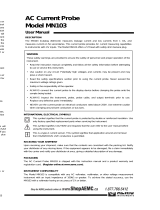
Repair and Calibration
To ensure that your instrument meets factory specications, we recommend that it be scheduled back to our
factory Service Center at one-year intervals for recalibration, or as required by other standards or internal
procedures.
For instrument repair and calibration:
You must contact our Service Center for a Customer Service Authorization Number (CSA#). This will ensure
that when your instrument arrives, it will be tracked and processed promptly. Please write the CSA# on the
outside of the shipping container. If the instrument is returned for calibration, we need to know if you want a
standard calibration, or a calibration traceable to N.I.S.T. (Includes calibration certicate plus recorded calibra-
tion data).
Ship To: Chauvin Arnoux®, Inc. d.b.a. AEMC® Instruments
15 Faraday Drive, Dover NH 03820 USA
Phone: (800) 945-2362 (Ext. 360) • (603) 749-6434 (Ext. 360)
Fax: (603) 742-2346 or (603) 749-6309
(Or contact your authorized distributor)
Costs for repair, standard calibration, and calibration traceable to N.I.S.T. are available.
NOTE: You must obtain a CSA# before returning any instrument.
Limited Warranty
The Model 6417 is warranted to the owner for a period of two years from the date of original purchase against
defects in manufacture. This limited warranty is given by AEMC® Instruments, not by the distributor from whom
it was purchased. This warranty is void if the unit has been tampered with, abused or if the defect is related to
service not performed by AEMC® Instruments.
Full warranty coverage and registration is available on our website: www.aemc.com/warranty.html
Please print the online Warranty Coverage Information for your records.
What AEMC® Instruments will do:
If a malfunction occurs within the warranty period, you may return the instrument to us for repair, provided we
have your warranty registration information on le or a proof of purchase. AEMC® Instruments will, at its option,
repair or replace the faulty material.
Warranty Repairs
What you must do to return an Instrument for Warranty Repair: First, request a Customer Service Authorization
Number (CSA#) by phone or by fax from our Service Department (see address below), then return the instru-
ment along with the signed CSA Form. Please write the CSA# on the outside of the shipping container. Return
the instrument, postage or shipment pre-paid to:
Ship To: Chauvin Arnoux®, Inc. d.b.a. AEMC® Instruments
15 Faraday Drive, Dover NH 03820 USA
Phone: (800) 945-2362 (Ext. 360) • (603) 749-6434 (Ext. 360)
Fax: (603) 742-2346 or (603) 749-6309
NOTE: You must obtain a CSA# before returning any instrument.
Technical and Sales Assistance
If you are experiencing any technical problems, or require any assistance with the proper operation
or application of your instrument, please call, fax or e-mail our technical support team:
Chauvin Arnoux®, Inc. d.b.a. AEMC® Instruments
Phone: (800) 945-2362 (Ext. 351) • (603) 749-6434 (Ext. 351)
Fax: (603) 742-2346
Contact:












 1
1
 2
2
 3
3
 4
4
 5
5
 6
6
 7
7
 8
8
 9
9
 10
10
 11
11
 12
12













